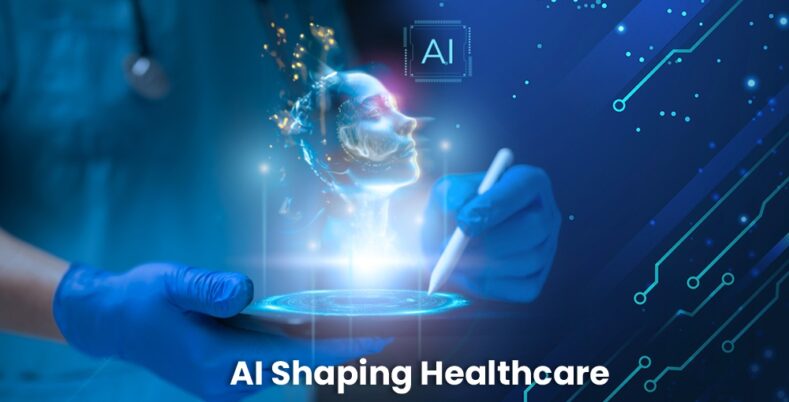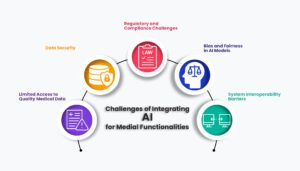Artificial intelligence (AI) is everywhere! It's one of the technologies expanding the fastest right now. From day-to-day routine tasks to industries like finance, education, healthcare, eCommerce, and more, AI is impacting every nook and corner. Amongst the many, AI in healthcare is quite an important topic at present. AI plays a key role in analyzing and processing complex healthcare data, diagnosing diseases, and offering personalized treatment plans.
By 2030, the healthcare industry's use of AI is predicted to reach $187.95 billion, according to the latest statistics. With no signs of dropping back, AI and healthcare are a big trend you need to be informed and aware of.
Exactly, to make things easy, in this blog we’ll discuss the impact of AI on healthcare, its benefits, use cases, challenges, and everything around it.
How AI Works in Healthcare?
Artificial Intelligence healthcare is nothing but implementing intelligent algorithms and technology that mimic human cognitive abilities and thus can learn, solve problems, and make decisions to improve medicinal care. Algorithms analyze and interpret tremendous amounts of data, ranging from text to images, audio, and video, to establish patterns and make predictions.
Machine learning, one of the AI algorithms, is used in the analysis of tremendous amounts of data and delivers insights, in short, to improve patient's experience. Some algorithms used in healthcare are:
- Natural Language Processing: Enables human language to be read and produced by systems.
- Computer Vision: Helps to analyze medical images and visuals.
- Reinforcement Learning: Learn and make informed decisions on a trial-and-error basis.
These above technologies are enhancing the healthcare segment by improving research, AI medical diagnosis, treatment, and more.
Listing the Prime Benefits of AI in Medicine:
Informed Patient Care
The first and foremost thing when it comes to patients is their proper treatment and care. Healthcare AI plays an outstanding role in real-time clinical decision-making. Machine learning algorithms offer the right information, evidence, and treatment suggestions, boosting a patient’s overall health.
Error Reduction
We cannot ignore the fact that humans are prone to errors. Moreover, AI helps to reduce medical errors, thereby improving drug management, resulting in more precise diagnoses and fewer adverse events.
Cutting Down on Costs
Artificial intelligence even cuts down expenses by automating tasks, aiding online, automating mundane tasks, and making the entire heavy work easy and streamlined.
Boosting Doctor-Patient Interaction
Chatbots are in the center stage today. How can we ignore them in the healthcare sector? Patients can inquire and book appointments at any time of the day. Plus, In order to improve patient interactions and treatment continuity, AI technologies also help with screening patient concerns and emphasizing significant data for clinician attention.
Delivering Contextual Relevance
Deep learning and Natural Language Processing (NLP) enable AI systems to decipher clinical documentation context. AI, for instance, can accurately distinguish between freshly prescribed and existing drugs in patient notes, improving data accuracy and medical record-keeping.
Key Challenges of Integrating AI for Medical Functionalities:
1. Limited Access to Quality Medical Data
AI systems need high-quality data to deliver the right results. Additionally, medical records are dispersed throughout many EHR platforms. Varying systems use varying formats, making it difficult to gather, distribute, and apply data to train and test AI tools.
2. Data Security
Every hospital has huge amounts of patients' personal information stored in databases, which makes it prone to cyberattacks. Thus, it’s important to maintain the security of patient data while using AI.
3. Regulatory and Compliance Challenges
Strict adherence to regulations like HIPAA is necessary when implementing AI in healthcare. Furthermore, satisfying innovation with legal constraints around data usage, consent, and privacy protection may hamper or complicate the deployment of AI.
4. Bias and Fairness in AI Models
The AI systems that are trained on non-representative datasets can generate biased results, which thereafter can lead to misdiagnosis or improper treatment. Ensuring fairness in AI models is key to providing equal healthcare delivery.
5. System Interoperability Barriers
The majority of healthcare systems use incompatible platforms that prevent seamless data sharing and operate in silos. The largest obstacle to integrating AI solutions that rely on end-to-end, real-time data access is this lack of integration.
Wrapping it Up!
AI and healthcare are two terms that have started progressing hand in hand with enhanced integration rates. Considering the benefits mentioned above, we can say that AI works at a good level in improving the overall patient experience, diagnosis, treatment plans, and more. However, as it’s said, every coin has two sides. It, by far, comes with challenges that need to be addressed, too.
Despite the promise, AI’s role in medicine is still evolving, with research ongoing and standards yet to be fully established. Nevertheless, technology holds immense potential to support clinicians, researchers, and patients alike.
To stay updated with the latest AI topics, check out our website now!
Recommended For You:






